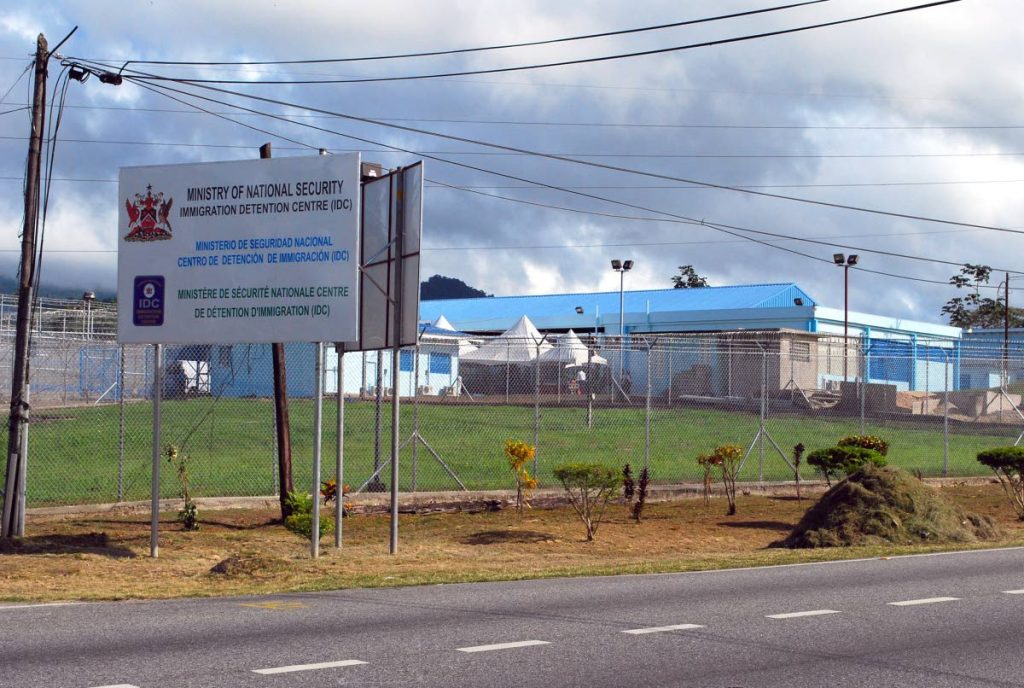$25m to keep immigrants at IDC

ABOUT $23 million a year is spent to house illegal immigrants and another $2 million each year to deport some of them, yet many detainees languish at the Immigration Detention Centre (IDC) because the language barrier slows down the processing of their cases.
This was revealed in a recent report by Parliament’s Joint Select Committee (JSC) on Human Rights.
The IDC was run at a cost of $12 million in 2014, $16 million for each year of 2015-2018, and $23 million in 2019 (recurrent expenditure). A further $6 million was spent on development work at the IDC over the past three years.
Further, $9 million was spent in repatriation costs from 2012-2016.
This was $2 million in 2012/2013, $2 million for 2013/2014, $4 million for 2014/2015 and $790,000 for 2015/2016. The $4 million bill for 2014/2015 included $2.48 million to charter an aircraft to Nigeria.
Without specifying any year, the report added, “The last two airline charters each cost an estimated $3 million and $5 million respectively.”
Of the 716 immigrants deported from the IDC in 2016, 162 were Jamaicans, 127 Guyanese, 101 Venezuelans, 95 Chinese, 78 were from the Dominican Republic and 31 were from Nigeria. The report shows the cost of deporting a Nigerian was $235,904, including his one-way ticket ($36,000) plus return tickets for three escorts at $57,000 each, totalling $172,440.
Despite this big expenditure, the report notes detainees complaining of difficulties posed by the language barrier, which impeded the hearing of their cases, whether applying for refugee status or fighting deportation.
Amid a huge influx of Venezuelan migrants, the IDC has only two staff members with CSEC passes in Spanish, respectively grade 1 and grade 2, amid a detainee population at any time of 120. One employee also speaks Mandarin Chinese.
The report showed a snapshot for March 2018, when out of 126 detainees at the IDC, some 81 were Venezuelan (51 men and 30 women). For all of 2017, some 585 detainees passed through the IDC, of whom 227 were Venezuelans (145 men and 82 women). For 2016, passing through the IDC were 1,146 people, of whom 222 were Venezuelans (125 men and 97 women).
“Approximately 19,000 Venezuelans entered the country legally from 2017 to 2018, and 17 per cent have overstayed their time in the country,” said the report. “Given the increase in detainees from Latin American countries, the IDC should recruit an in-house Spanish interpreter to facilitate communication between detainees and officials."
It also recommended, "Given the influx in the number of Venezuelan detainees at the IDC from 2015 to 2018, the Ministry of National Security should review other alternatives to detention.”
The report said detention at the IDC was due to breaches of the Immigration Act such as illegal entry, overstayed visit/working illegally/expired travel documents, drug trafficking or tendering counterfeit currency or fraudulent documents.
“Detention at the IDC is utilised as a last resort, after immigration officers have sought a relative or person who is willing to put up a security bond for detainee custody release under an order of supervision.”
In TT some 1,700 immigrants were on orders of supervision, paying a refundable security bond and being monitored by a team of 19 supervision officers.
Nine IDC detainees are awaiting deportation after imprisonment or paying criminal fines, but there are challenges in deporting them. These include the high cost of airfare, lack of permission to transit certain countries, language barrier and lack of interpreters, cost of escorts and the problems with the identification of detainees and acquisition of travel documents for them.
“The unwillingness of some detainees to sign visa documents or provide accurate personal identification information contributes to delays with the repatriation process.”
As of April 2018, the IDC held 25 people from African countries who lacked travel documents to be repatriated. The Ministry of National Security had sourced funds for this and found a route through Turkey, but this route was no longer feasible.
The report lamented the Immigration Act failed to specify the treatment of people who were refugees or registered as asylum seekers in TT.
The report noted discrepancies in the treatment of detainees between submissions from the Ministry of National Security and NGOs such as the Living Water Community (LWC) and the Emancipation Support Committee (ESCTT).
Living Water said an absence of procedures to submit complaints, as compounded by language barriers, had resulted in the alleged payment of bribes and a fear to submit complaints.
“The ESCTT indicated there was discriminatory treatment of detainees based on race and nationality that impacted the length of detention and punishments.”
The report noted concerns that IDC detainees were separated from their children.
“Female detainees were not allowed to have their children at the IDC and separate children accommodations were made at children homes. Children are allowed to visit the mothers via a special request made by the mother to the IDC officials,” the report said. “According to the ESCTT, family life is severely impacted due to the physical separation of husbands from wives and children. ESCTT recommended measures to permit the introduction of special family visits at reasonable intervals at IDC.”
Detainees are "aired" for two hours a day, a limit questioned by the report.
The report noted two cases of harm to detainees included suicide.
“A female Guyanese in 2013 committed suicide via hanging from the rafters of the ceiling of the washroom of the dormitory in the female housing unit.”
The report said the ESC lamented that a Ghanaian man was beaten in 2014, suffering head injuries, damage to his ear and chest pains. Subsequent lack of medical treatment led to him losing hearing in his left ear, plus an unhealed fracture that caused other medical problems.


Comments
"$25m to keep immigrants at IDC"